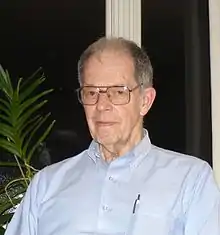Howard H. Pattee
Howard Hunt Pattee (born October 5, 1926) is an American biologist, Professor Emeritus at Binghamton University and Fellow of the American Association for the Advancement of Science. He graduated at Stanford University in 1948 and completed a Ph.D. there in 1953.
Howard H. Pattee | |
|---|---|
 | |
| Born | October 5, 1926 Pasadena, CA |
| Education | BA, Stanford University, 1948 PhD Physics, Stanford University, 1953 |
| Awards |
|
| Scientific career | |
| Fields |
|
| Institutions | |
| Thesis | The Compound Reflection X-ray Microscope, Stanford, 1953. |
| Doctoral advisor | Paul H. Kirkpatrick |
| Doctoral students | |
| Influences | |
| Website | www |
Contributions
Professor Pattee's main research interests are theoretical biology with a focus on origin of life, artificial life, biosemiotics, semiotic control of dynamic systems, and the physics of codes and symbols. His many contributions to the "symbol-matter" problem within the cell have had much influence on theoretical biology, biosemiotics, complex systems and artificial life.[1][2]
Present title
- Professor Emeritus, Department of Systems Science and Industrial Engineering, Thomas J. Watson School of Engineering and Applied Science, State University of New York at Binghamton, NY, 1998.
Previous positions
- Professor, Department of Systems Science and Industrial Engineering, T. J. Watson School of Engineering, State University of New York at Binghamton, NY, 1975–98
- Director of Graduate Studies, Department of Systems Science, School of Advanced Technology, State University of New York at Binghamton, NY, 1975–85
- Research Professor, Department of Biophysics and Center for Theoretical Biology, State University at Buffalo, 1971–75
- Acting Director, Biophysics Laboratory, Stanford University, 1967–68
- Senior Research Associate, Biophysics Laboratory, Stanford University, 1960–64
- Research Associate, Physics Department, Stanford University, 1953–60
Fellowships and awards
- Fellow, American Association for the Advancement of Science, 1984
- Resident Scholar, Villa Serbelloni (Rockefeller Foundation), 1969
- Senior Postdoctoral Fellow, National Science Foundation at Karolinska Institute, Department of Medical Physics, 1960
- Sigma Xi Research Award, Stanford University, 1953
- Alfred P. Sloan Fellow, Stanford University, 1953
Eponymous species
- In 2019, a lichen species new to science, Catillaria patteeana, was named for Dr. Pattee.[3]
References
- Rocha, Luis M. (2001). "The physics and evolution of symbols and codes: reflections on the work of Howard Pattee". Biosystems. 60 (1–3): 1–4. doi:10.1016/s0303-2647(01)00103-4. PMID 11325499.
- Umerez, Jon (17 October 2009). "Where Does Pattee's "How Does a Molecule Become a Message?" Belong in the History of Biosemiotics?". Biosemiotics. 2 (3): 269–290. doi:10.1007/s12304-009-9064-2.
- Waters, Dennis P.; Lendemer, James C. (2019). "The Lichens and Allied Fungi of Mercer County, New Jersey " (PDF). Opuscula Philolichenum. 18: 17–51.
Publications
- Bibliography
- Downloadable papers
- Howard H. Pattee. Hierarchy theory: the challenge of complex systems. G. Braziller, 1973.
- Howard H. Pattee and Joanna Rączaszek-Leonardi. Laws, Language and Life: Howard Pattee’s classic papers on the physics of symbols with contemporary commentary. Springer, 2012. doi:10.1007/978-94-007-5161-3.
- Howard H. Pattee; Kalevi Kull 2009. A biosemiotic conversation: Between physics and semiotics. Sign Systems Studies 37(1/2): 311–331.
This article is issued from Wikipedia. The text is licensed under Creative Commons - Attribution - Sharealike. Additional terms may apply for the media files.